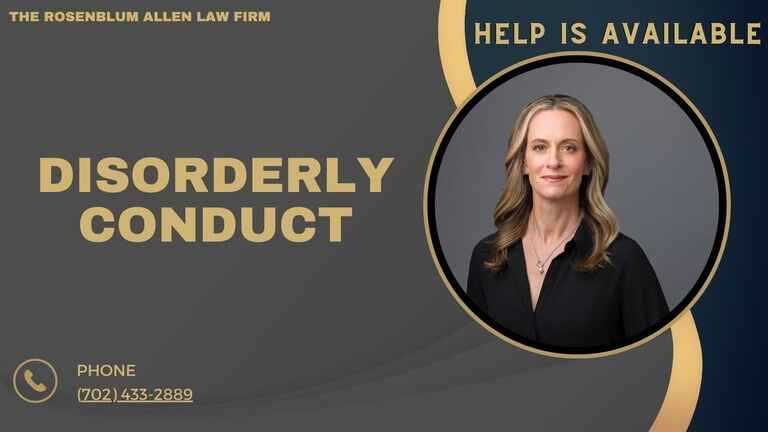Disorderly Conduct: Definition and Overview
Definition of Disorderly Conduct
Disorderly conduct is a legal term used to describe a variety of behaviors that disrupt public peace or safety. It generally involves actions that cause annoyance, alarm, or a breach of the peace. Although the specific definition can vary from state to state, disorderly conduct typically includes behaviors that are offensive or disruptive in public settings.

Elements of Disorderly Conduct
To establish a charge of disorderly conduct, certain elements must be present. These may include:
- Intent: The individual must have intended to cause a disturbance or should have known their actions would likely cause one.
- Conduct: The behavior must be of a nature that it disrupts public peace.
- Location: The incident usually occurs in a public place, such as streets, parks, or other communal areas.
Examples of Disorderly Conduct
Disorderly conduct can manifest in various forms. Common examples include:
- Loud and disruptive behavior in public places
- Fighting or engaging in violent confrontations
- Obstructing traffic or public pathways
- Public intoxication that results in disruptive actions
- Using offensive language or gestures in public
Legal Framework for Disorderly Conduct
State Laws Governing Disorderly Conduct
Disorderly conduct laws are primarily established at the state level, meaning they can differ widely across jurisdictions. Some states classify it as a misdemeanor, while others may treat it as a civil offense. Familiarizing yourself with the specific laws in your state is essential if you face charges.
Differences Between State Laws
Here’s a brief overview of how some states approach disorderly conduct:
| State | Classification | Potential Penalties |
|---|---|---|
| Nevada | Misdemeanor | Fines, community service, up to 6 months in jail |
| California | Misdemeanor | Fines, probation, up to 6 months in jail |
| Texas | Class C Misdemeanor | Fines up to $500 |
| New York | Violation | Fines, up to 15 days in jail |
Relevant Legal Terminology
Understanding the legal language surrounding disorderly conduct can help clarify the issue. Here are some key terms:
- Misdemeanor: A lesser criminal offense typically punishable by fines or short-term imprisonment.
- Violation: A less serious infraction that usually results in fines or penalties rather than jail time.
- Breach of Peace: An act that disturbs the tranquility of a public space or community.

Common Scenarios Involving Disorderly Conduct
Public Intoxication
Public intoxication is one of the most common forms of disorderly conduct. It can lead to aggressive behavior, loud outbursts, or even physical altercations. Authorities often intervene to maintain public safety.
Disturbing the Peace
This encompasses any action that disrupts the peace of others. Examples include loud music, yelling, or any behavior that interferes with the rights of others to enjoy their surroundings.
Fighting or Engaging in Violent Behavior
Physical confrontations, whether between individuals or groups, fall under disorderly conduct. Law enforcement typically intervenes to separate those involved and restore order.
Obstructing Justice
Actions that hinder law enforcement in their duties can also lead to disorderly conduct charges. This includes refusing to comply with police orders or obstructing investigations.
Disorderly Conduct in a Public Place
Public areas are intended for communal use, and any behavior that disrupts this purpose can lead to charges. This might include harassment, creating a dangerous situation, or behaving in a manner that offends others.
Potential Consequences of Disorderly Conduct
Criminal Charges and Penalties
Being charged with disorderly conduct can lead to serious consequences. The specific penalties depend on the jurisdiction and the nature of the offense. Here’s what you might face:
- Fines: Many jurisdictions impose fines that can vary widely. They can range from a few hundred dollars to several thousand.
- Community Service: Offenders might be required to complete a certain number of community service hours.
- Probation: Instead of jail time, you might be placed on probation, which comes with specific conditions.
- Jail Time: Depending on the severity, disorderly conduct can lead to jail sentences. Misdemeanor charges can result in up to six months in jail, while felony charges may lead to longer sentences.
Misdemeanor vs. Felony Charges
Understanding the difference between misdemeanor and felony charges is important:
Misdemeanor Charges: These are less severe offenses. They often involve minor acts of disorderly conduct. Penalties usually include fines and short jail sentences.
Felony Charges: These are more serious offenses that can involve violence or severe disruption. Convictions can lead to significant prison time and long-lasting impacts on your record.
Fines and Restitution
Fines can vary greatly depending on the specifics of the case. Here’s a general idea:
| Offense Type | Typical Fine Amount |
|---|---|
| Minor Disturbance | $100 – $500 |
| Public Intoxication | $200 – $1,000 |
| Physical Altercation | $500 – $2,500 |
In some cases, courts may also require restitution, meaning you must pay for any damages caused during the incident. This can include medical bills or property damage.
Possible Jail Time
The likelihood of jail time depends on several factors:
- Prior Offenses: If you have a history of similar charges, you might face harsher penalties.
- Severity of the Conduct: Actions that endanger others or lead to injury can result in longer sentences.
- State Laws: Different states have various laws and guidelines regarding disorderly conduct penalties.

Defenses Against Disorderly Conduct Charges
If you find yourself facing disorderly conduct charges, several defenses may help your case.
First Amendment Rights
You may argue that your behavior fell under your right to free speech. This is particularly relevant if your actions involved expressing opinions or protest.
Self-Defense Claims
If you were acting in self-defense during an altercation, this can serve as a valid defense. You need to prove that your actions were necessary to protect yourself from harm.
Lack of Intent
To be convicted of disorderly conduct, you typically need to have intended to cause a disturbance. If you can demonstrate that your actions were accidental or unintentional, this may help your case.
Necessity Defense
In some situations, you might claim necessity—arguing that your actions were taken to prevent a greater harm. For example, if you were trying to stop someone from harming another person.
Challenging Evidence
You can question the evidence presented against you. If the police did not follow proper procedures during your arrest, or if the evidence is weak, it may not hold up in court.
The Role of Law Enforcement in Disorderly Conduct Cases
Arrest Procedures
When law enforcement responds to a disorderly conduct incident, they may arrest individuals involved. The arrest process can include:
- Identifying Individuals: Officers will identify those who may be causing the disturbance.
- Assessing the Situation: They will evaluate the situation to determine if an arrest is necessary.
- Use of Force: Officers must use appropriate levels of force, only escalating when necessary.
Interactions with Law Enforcement
It’s essential to interact respectfully with law enforcement, even if you feel wronged. Here are some tips:
- Stay Calm: Keep your emotions in check. Getting upset can escalate the situation.
- Cooperate: Follow instructions from officers. Non-compliance can lead to additional charges.
- Know Your Rights: You have the right to remain silent and seek legal counsel.
Filing a Complaint Against Law Enforcement
If you believe your rights were violated during your interaction with law enforcement, you have options:
- Document the Incident: Write down details of what happened, including names and badge numbers.
- Contact Internal Affairs: Most police departments have a process for filing complaints.
- Seek Legal Assistance: Consulting with a lawyer can help you navigate the complaint process.

Breaking It Down for You
Disorderly conduct charges can have far-reaching effects. Understanding how they impact various aspects of life is vital. By being aware of potential consequences and taking proactive steps, you can navigate this challenging situation more effectively. Whether it’s protecting your reputation, avoiding future charges, or addressing underlying issues, knowledge is power.

Frequently Asked Questions
What constitutes disorderly conduct?
Disorderly conduct typically includes behaviors that disturb the peace or provoke violence. This can involve fighting, making unreasonable noise, or using offensive language in public. The exact definition can vary by jurisdiction.
What are the penalties for disorderly conduct?
Penalties for disorderly conduct can range from fines to jail time. In many places, it is classified as a misdemeanor, which can carry a fine of several hundred dollars or up to 90 days in jail. Repeat offenders may face harsher penalties.
Can disorderly conduct charges be dismissed?
Yes, disorderly conduct charges can sometimes be dismissed. This often depends on the circumstances surrounding the arrest, the evidence available, and whether the defendant agrees to take part in diversion programs.
What defenses are available against disorderly conduct charges?
Common defenses include arguing that the behavior was protected under free speech rights or that the actions were misinterpreted by law enforcement. Lack of intent to disturb the peace can also serve as a defense.
How can I expunge a disorderly conduct charge from my record?
Expunging a disorderly conduct charge typically involves filing a petition with the court. This process varies by state, so it’s important to check local laws and requirements. An attorney can guide you through the process.
Are there any diversion programs available for disorderly conduct charges?
Many jurisdictions offer diversion programs for first-time offenders. These programs often require individuals to complete community service or attend counseling sessions, allowing them to avoid a criminal record if successful.
What should I do if I am wrongfully accused of disorderly conduct?
If you are wrongfully accused, it’s important to document everything. Gather witness statements, collect any available evidence, and consider consulting with an attorney. They can help you navigate the legal process and defend your rights.
How does disorderly conduct differ from other criminal offenses?
Disorderly conduct is typically less serious than felony offenses and may be categorized as a misdemeanor. It often involves minor disturbances rather than violent crimes. Understanding these distinctions can help in assessing potential legal repercussions.
Can a disorderly conduct charge affect my ability to travel?
In most cases, a disorderly conduct charge should not restrict domestic travel. However, if you are on probation or have unresolved legal issues, it might affect your ability to travel internationally. Always check with legal counsel before making travel plans.
Is it possible to negotiate a plea deal for disorderly conduct charges?
Yes, plea deals are often possible in criminal cases, including disorderly conduct. Negotiating a plea deal can reduce charges or penalties, but the specifics depend on the case and the prosecutor’s willingness to negotiate.

Glossary
Disorderly Conduct: A legal term referring to actions that disrupt public peace or order, which can include fighting, making excessive noise, or using offensive language.
Misdemeanor: A classification of a crime that is less serious than a felony, often punishable by fines or shorter jail sentences, typically less than one year.
Diversion Program: A court-sanctioned program that allows individuals charged with certain offenses to complete specific requirements (such as community service or counseling) to avoid a criminal conviction.
Expungement: The legal process of removing a conviction from an individual’s criminal record, effectively sealing it from public view.
Plea Deal: An agreement between the defendant and the prosecutor in which the defendant agrees to plead guilty to a lesser charge or accept a reduced sentence in exchange for a concession from the prosecution.
Public Peace: A term that refers to the overall safety and tranquility of a community, which can be disrupted by criminal or disorderly behaviors.
Probation: A court-ordered period of supervision over an offender, allowing them to remain in the community instead of serving time in jail, often with specific conditions to follow.
Witness Statement: A formal account given by someone who observed an event related to a legal case, which can be used as evidence in court.
Free Speech Rights: The constitutional right to express oneself freely without censorship or restraint, protected under the First Amendment of the United States Constitution.
Intent: The mental state of a person when committing an act, often considered in determining whether a crime was committed intentionally or recklessly.
Conviction: A formal declaration that someone is guilty of a crime, following a trial or plea agreement.
Arrest: The act of law enforcement detaining an individual suspected of committing a crime, typically requiring probable cause.
Offensive Language: Speech that is insulting, abusive, or otherwise disrespectful, which may provoke disorderly conduct charges.
Disturbing the Peace: Engaging in actions that disrupt the tranquility of a community, often leading to disorderly conduct charges.
Legal Counsel: A lawyer or attorney who provides advice and representation to clients regarding legal matters.
Defendant: An individual accused of a crime in a court of law.
Probable Cause: A reasonable basis for believing that a crime may have been committed, justifying an arrest or search.
Community Service: A form of punishment requiring an individual to perform a certain number of hours of unpaid work for the community, often part of a diversion program or sentence.

Additional Resources for You
Molly Rosenblum, Esq., our lead attorney, has not only established herself as a formidable presence in the courtroom but has also developed a comprehensive collection of resources to support those facing legal challenges. These resources, available through the Rosenblum Law website, offer in-depth information, guidance, and support for a wide range of criminal defense issues. Whether you’re dealing with charges related to DUI, domestic violence, drug possession, or any other criminal matter, these resources are designed to help you understand your rights and options. Here’s a brief overview of what you can find:
Criminal Defense Attorneys: A cornerstone resource for anyone facing criminal charges, providing an overview of defense strategies and what to expect from the legal process. Explore the resource.
Las Vegas DUI Lawyer: Specialized guidance for those facing DUI charges in Las Vegas, offering insights into defense tactics and legal implications. Learn more about DUI defense.
Domestic Violence Lawyer Las Vegas: Dedicated support for individuals accused of domestic violence, detailing defense strategies and the potential consequences of these charges. Discover domestic violence defense strategies.
Drug Possession Lawyer: Essential information for those charged with drug possession, including defense approaches and legal advice. Read about drug possession defense.
Sex Crimes Attorney: Specialized resources for defending against sex crime allegations, offering insights into legal strategies and the importance of a strong defense. Explore sex crimes defense.
CPS Defense Attorney: Guidance for cases involving Child Protective Services (CPS), focusing on defense against allegations of child abuse and neglect. Learn about CPS defense.
Misdemeanor Lawyer: Information on defending against misdemeanor charges, highlighting the legal nuances and potential impacts. Understand misdemeanor defense.
Juvenile Defense Lawyers: Dedicated resources for juvenile defense, offering legal advice and support for young individuals facing charges. Read about juvenile defense.
Las Vegas Warrant Defense Attorney: Assistance for individuals with outstanding warrants, detailing steps to address and resolve warrants effectively. Learn about warrant defense.
Las Vegas Probation Violation Attorney: Support for those accused of violating probation, offering guidance on legal options and defense strategies. Explore probation violation defense.
Theft Crime Defense Lawyer: Insights into defending against theft charges, including shoplifting, burglary, and other theft-related offenses. Understand theft crime defense.
Kidnapping Lawyers: Expert advice for defending against kidnapping charges, focusing on legal defenses and the complexities of such cases. Learn about kidnapping defense.
Firearms Lawyer Las Vegas: Guidance for individuals facing firearms-related charges, detailing legal rights and defense strategies. Read about firearms defense.
Through these resources, Molly Rosenblum, Esq. aims to empower individuals with the knowledge and tools necessary to navigate the legal system effectively. We encourage you to utilize these resources to better understand your legal situation and options.

Offsite Resources for You
Nevada Revised Statutes: This is the official website for the Nevada Revised Statutes, where you can find the complete text of the law in Nevada.
The Nevada Judiciary: This is the website for the Nevada court system, with resources including court forms, information on how the court system works, and more.
Nevada Department of Corrections: This site provides information on the prison system in Nevada, including the locations of facilities, information on visiting inmates, and more.
Nevada Bar Association: The official website of the Nevada Bar Association, providing resources and information for both legal professionals and the public.
American Civil Liberties Union of Nevada: The ACLU of Nevada works to protect and extend the civil liberties and rights of all Nevadans.
Legal Aid Center of Southern Nevada: This non-profit law firm offers free legal advice and representation to low income residents of Southern Nevada.

A Special Message from Our Lead Attorney

Molly Rosenblum
Dear Reader,
Thank you so much for taking the time to read through our resources on disorderly conduct. We understand that dealing with criminal charges can be overwhelming and confusing. That’s why we’re dedicated to providing you with comprehensive information to help you navigate through this challenging time.
Remember, you don’t have to face these challenges alone. As a seasoned attorney, I’m here to help you understand your rights and potential defenses. Every situation is unique, and a personalized consultation can make a significant difference in understanding the nuances of your case.
I invite you to schedule a free consultation with me. Please feel free to call at (702) 433-2889. Let’s discuss your case, explore your options, and create a strategy to move forward.
Thank you once again for your time, and I look forward to the opportunity to assist you.
Best regards,
Molly Rosenblum, Esq.




